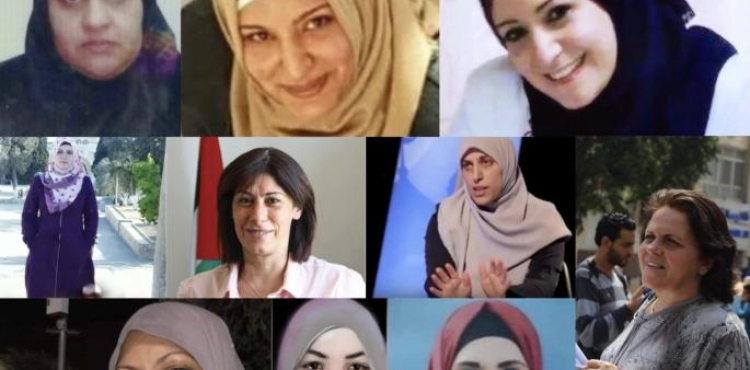The Israeli occupation has arrested 12 Palestinian mothers in its prisons, out of 37 prisoners who are languishing in “Damoun” prison and the “Hasharon” detention center.
A report by the Prisoners´ Club and the Addameer Foundation on the eve of “Mother’s Day / March 21,” stated that captive mothers have 33 daughters and sons, and they are deprived of open visits and enabling them to embrace their children and children. And the prisoners from the visit, which was reduced to once every two months and restricted to one adult family member.
A group of mothers are serving prison terms for years, and they are the prisoner, Israa Jaabis, who is sentenced to 11 years in prison, and both Fadwa Hamada and Amani Al-Hashem, who are serving a ten-year prison sentence, Helwa Hammara and Nasreen Hassan for six years, and the captive Inas Asafra for two and a half years (30) One month, Khaleda Jarrar for two years, and Iman al-Awar for a period of (22) months, and the detained woman, Aya al-Khatib, remains under trial to this day.
Among the mothers are two administrative detainees who are the feminist activist and head of the Union of Palestinian Women Committees, Khatam Al Sa´afin from Ramallah, and Shorouk El-Badan from Bethlehem.
On 3/8/2021, the occupation forces arrested Anhar al-Hajjah from Ramallah, who is a mother of a child and a three-month pregnant woman. Her condition was not taken into consideration, but the occupation placed her in "Hasharon" prison in harsh and difficult conditions.
The report showed that Palestinian female prisoners are subjected to all kinds of abuse and torture by the occupation authorities against Palestinian detainees, starting from arrests from homes at dawn to transfer to detention and interrogation centers, and later their detention in prisons and deportation from their sons and daughters for a long period.
In a related context, the occupation authorities have escalated, since 2015, the targeting of Palestinian women, as the number of women who have been arrested has reached more than (900), among them mothers of prisoners and martyrs, and underage girls, through systematic arrests, especially in Jerusalem.
The suffering of female prisoners exacerbated, with the prison administration continuing its refusal to allow female prisoners to communicate by phone with their families on a regular basis, as the female prisoners contacted their families for one time in May 2020 since the outbreak of the epidemic, and the administration is still procrastinating in installing public phones for prisoners, in violation of the rule. 26 of the United Nations Rules for the Treatment of Women Prisoners - the Bangkok Declaration - that encourage female prisoners to communicate with their family members, as this contact is conducted by all reasonable means. We recall the captive Nisreen Hassan from Gaza, who was arrested on 10/18/2015 and her 7 children, in addition to her husband, have not been able to visit her since her arrest for "security reasons," as the occupation claims, and there is no way to check on her except for visits by a lawyer.
The occupation authorities practice methods of torture and abuse against female prisoners, represented by detaining them in cells that are not suitable for human life, in addition to the living conditions they suffer, which the prison administration disavows on the pretext that there is not enough budget to carry out reforms that threaten the lives of prisoners, as prisoners suffer from high humidity in The rooms during the winter period, in addition to a problem in the floor of the Fora Square, the prisoners are also forced to use the covers to close the bathrooms, and the prisoners suffer from the presence of cameras in the courtyard, which violates their privacy. Over the past years, the female prisoners have taken protest steps to reject the prison administration´s continued violation of their privacy in various ways and methods.
Women prisoners are subjected to long-term interrogation accompanied by methods of physical and psychological torture, including: the shabeh in its various positions, being restricted throughout the investigation period, deprivation of sleep for long periods, continuous investigation, isolation, extortion and threats, preventing lawyers from visiting them during the investigation period, subjecting them to a lie detector, and severe beatings. Such as the continuous slapping and solitary confinement, and their families were subjected to abuse, arrest and summoning as part of the policy of collective punishment, in addition to that, female prisoners are denied regular medical care by a specialized female gynecologist.












